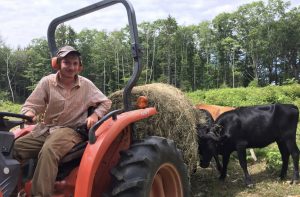Environmental Internship Grants Put Students in the Field
This year, thanks to the generosity of Marlboro’s donors, more than $55,000 in grants was awarded to students to extend their learning beyond campus. Over a quarter of that, or $15,000, was for environmental internship grants supported by longtime trustee and alumni parent Karen Davis (P’03, P’12) and her husband Dave. These grants stand to enrich the educational experience of students focused on environmental studies and related fields, and enhance their learning about solutions to some of the earth’s knottiest environmental issues.
Senior Daniel Medeiros used his grant to visit the Yellowstone Heritage and Research Center, in Gardiner, Montana, and photograph the museum’s collection of grey wolf skulls for his Plan research comparing the rate of tooth decay in different wolf populations. He also volunteered at Mission: Wolf, a refuge for 28 captive wolves and wolf/dog hybrids in Westcliffe, Colorado, where he was able to build on his wolf research.
“One very positive element of being at the refuge was having the opportunity to directly observe wolf behavior—albeit in captivity, where their behavior is very different from what it is in the wild,” said Daniel. “I was able to interact directly with the wolves, watch how they interact with one another, and to watch the way they chew on bones to clean their teeth.”
For her World Studies Program internship, junior Leni Charbonneau worked as a research assistant at the Center for Minority and Environmental Policy Studies (Cemipos), based in Sapporo, Japan. She is involved with a number of organizations through Cemipos, building awareness of issues facing the ethnic minority Ainu community.
“With the Ainu Women’s Association, I helped organize and plan a seven-day indigenous women’s empowerment workshop in Sapporo, in collaboration with a political theater based out of Gdansk, Poland,” said Leni. She has also been conducting her own research in the Ainu-majority community of Nibutani, Biratori, Japan, and volunteering her time in a forest preserve that promotes traditional Ainu ecological knowledge.
Closer to home, as part of her Plan senior Kristen Thompson planted 32 regionally native, edible perennials around the community greenhouse and garden, including things like elderberry, thimbleberry, lowbush blueberry, and serviceberry. Meanwhile, junior Lydia Nuhfer catalogued flowering plant species around nearby South Pond, using both a formal transect method and a more informal perimeter survey.
“The process of the inventory proved to be both challenging and rewarding,” said Lydia. “It was a test of my plant identification skills, which helped me refresh that knowledge and apply it in my job as a nature educator.”

Hatchet Cove Farm, an organic vegetable farm in mid-coastal Maine, provided the location for sophomore Cedar van Tassel to work as an apprentice, and to learn about plant biology and physiology while planting and harvesting vegetables.
“All the day-to-day work has made me more aware of how food is produced on farms and how it gets to our dinner tables,” said Cedar (pictured, right), who wants to research ways to make agriculture less ecologically damaging.
Junior Hailey Mount used her grant to travel to Panama for a coral reef ecology program at the Institute for Tropical Ecology and Conservation (ITEC). Although her research interest is in ethnobotany, she found that the ITEC program included many transferrable topics and methods, such as surveying species diversity and calculating species density.
“I was able to complete relevant research on the algae diversity and ecosystem conditions on two infrequently-studied reefs, and simultaneously learn about environmental science, coral reefs, rainforests, coastal ecology, and some ethnobotany,” said Hailey. “I put into context a lot of the things I’ve been writing about in past tutorials and classes. From here I feel much more confident setting up travel and conducting research abroad for Plan.”
These kinds of formative experiences and the learning they promote are made possible through the support of donors like Karen, who believe in the importance of enhancing a Marlboro education with travel and internships.

